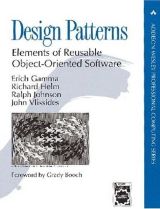


|
Design Patterns: Elements of Reusable Object-Oriented Software (Addison-Wesley Professional Computing Series) (精装)
by Erich Gamma, Richard Helm, Ralph Johnson, John Vlissides
| Category:
Design patterns, Software development, IT, Technology |
| Market price: ¥ 558.00
MSL price:
¥ 548.00
[ Shop incentives ]
|
| Stock:
Pre-order item, lead time 3-7 weeks upon payment [ COD term does not apply to pre-order items ] |
MSL rating:
 Good for Gifts Good for Gifts |
| MSL Pointer Review:
A modern classic in the literature of object-oriented development, it's a book of design patterns that describe simple and elegant solutions to specific problems in object-oriented software design. |
| If you want us to help you with the right titles you're looking for, or to make reading recommendations based on your needs, please contact our consultants. |

|
| |
AllReviews |
  1 2 Total 2 pages 11 items 1 2 Total 2 pages 11 items |
|
|
Jase (MSL quote), USA
<2007-01-11 00:00>
Need to waste time trying to prove it again.
However, I would like to say something to those readers who are totally new to design patterns and C++/Smalltalk - please do not be intimidated by the seemingly terse, dry and difficult style of this book. Since I myself am new to the world of design patterns, I would like to share with you my own experience and hope you can make a better decision when you pick your design patterns book.
Design Patterns is the classic text; its style is academic-oriented, rigorous, and terse. Unlike most popular computer books, you will find reading this book takes a lot of thinking, for each paragraph or even each sentence. Most examples used in this book are adapted from real world systems popular many years ago, so you will likely find you're not familiar with them at all. Moreover, some examples are related to GUI programming, so if you're mainly programming for backend, you will probably feel it's tough to understand some of the examples. Most code example in the book is written in C++ (some in Smalltalk.) If you're a Java programmer and have limited knowledge in C++, it might take you some time to guess what certain C++ syntax means.
These all seem to be negative comment, but my conclusion is to the contrary - this is the BEST book in the area, and you should read it despite of all the issues I mentioned above. I started my design pattern learning by using a couple of other books, such as Java Design Patterns: A Tutorial, Design Patterns Explained: A New Perspective on Object-Oriented Design, and Applied Java Patterns. I chose these books mainly because they seem to be much easier to understand than Design Patterns. However, after spending time in these alternative books, I found none of them offers the accuracy and depth as "Design Patterns". Often, after I read a chapter of the "easy" book, I feel I am still kind of lost. I seem to have understood the pattern I just learned, but then I feel it's not quite so. I guess I only learned the pattern in a superficial way, with little depth, and without being part of "big picture." Later, I turned to the classic, Design Patterns. I forced myself to sit down and try to understand the authors' terse and rigorous writing and their unfamiliar examples. Gradually I found I was getting used to the style and the examples, and I actually started to learn much more from this book than from others. After reading half-way through the book, I felt the rigorous style is actually a big plus for this book, because I can get more accurate and in-depth information.
Therefore, I strongly suggest that you buy and read this book, even if you feel it's difficult to read. Your effort will pay off eventually. Use other books as reference only. |
|
|
|
  1 2 Total 2 pages 11 items 1 2 Total 2 pages 11 items |
|
|
|
|
|
|